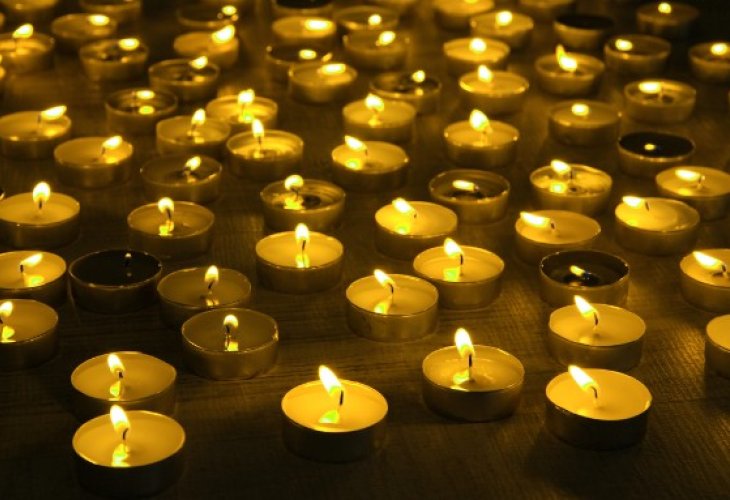Personal Stories
Kaddish for the Forgotten Flames: Honoring Holocaust Survivors Who Died Defending Israel
When entire families were wiped out, one man made sure someone would say Kaddish. This is the story of Yitzhak Klein’s sacred mission.
- Hidabroot
- |Updated

When I called the home of Yitzhak Klein in Petach Tikvah to speak with him about his “Kaddish for the Last Remnant” project, his wife answered the phone. “Yitzhak is no longer with us,” she said gently. “He passed away about two months ago.”
Despite the sad news, she wanted to speak about the article and share her late husband’s work. “It will elevate his soul,” she said.
Yitzhak Klein was 85 years old when he passed away. About ten years earlier, he had started a deeply meaningful initiative called “Kaddish for the Last Remnant.” As president of the Shoneh Halachot synagogue and chairman of the Distinguished Citizens of Petach Tikvah, he used his influence and connections to do something unforgettable.
He reached out to 23 synagogues in the city and gave each of them the names of fallen soldiers who had fought and died during Israel’s War of Independence. These weren’t just any soldiers, they were Holocaust survivors, the only ones left from families that had been completely destroyed in the camps. These young men and women had no one left in the world to say Kaddish, the traditional Jewish prayer recited in memory of the dead.
Klein asked the synagogues to include the names in the Yizkor memorial prayer. He also asked friends and acquaintances to “adopt” one of the fallen and take on the responsibility to say Kaddish for them each year on their yahrzeit (anniversary of death).
One hundred and forty-five soldiers, the very last remnants of their families had made it through the horrors of the Holocaust, only to fall in battle defending the new Jewish homeland. They left behind no parents, no siblings, no cousins. No one to say their names, to remember their birthdays, or to mark their yahrzeit.
On the memorial site built for them at Mount Herzl in 2004, a powerful inscription was engraved:
“The home that was there and is no more. The home they could have built here but will never rise. They were the last remnant of their families and are gone.”
According to research by Professor Hanna Yablonka, published in her book Foreign Brothers: Holocaust Survivors in the State of Israel 1948–1952, over 22,000 Holocaust survivors were drafted through the Gachal (the overseas volunteer units) during the War of Independence. At the time, the entire Israeli army numbered only about 60,000 soldiers.
Many of these survivors were thrown into fierce battles within days of arriving in Israel. One of the most tragic examples was the Battle of Latrun, where 15 new immigrants from the 'Seventh Brigade' were killed. Yigal Yadin, who would later become the IDF’s Chief of Staff, described the heartbreaking reality: “They came straight from the ship to the battlefield… They weren’t trained. It was a slaughterhouse for them.” Some died simply because they didn’t understand the Hebrew commands being shouted during battle. As a result, commanders began bringing Yiddish translators to help bridge the gap.
The pain of their deaths so soon after being rescued from the camps was made even more heartbreaking when it involved a person who was the last of their entire family. In the Kfar Etzion massacre, where Arab forces killed almost every defender of the village, 18 of the victims were Holocaust survivors. Seven of those women were the sole survivors of their families.
For decades, these heroes received little public recognition. Only recently have private groups begun to launch projects to honor their memory and encourage the Israeli Ministry of Defense to officially recognize them. Yitzhak Klein’s “Kaddish for the Last Remnant” was one of the earliest and most heartfelt of these efforts.
Klein didn’t just hand out names and disappear. He personally followed up. At the beginning of each Jewish month, he sent reminders to everyone who had taken on a name, so they’d remember to say Kaddish at the right time.
Even after his passing, his widow says the project continues.
Over the years, many deeply moving stories came to Klein. One of the most powerful was shared in a local newspaper by Avraham Marmorstein, a former deputy mayor of Petach Tikvah. Marmorstein had volunteered to say Kaddish for one of the fallen. When he received the name, he couldn’t believe what he saw: Mendel-Zeev, son of Hertzkel and Sheindel.
Mendel-Zeev had been his relative and neighbor from their hometown before the Holocaust. “I’ve been mentioning him in the Yizkor prayer for years,” Marmorstein said. Mendel-Zeev had lost his entire family in the camps. He came to Israel, enlisted in the army, and fell in one of the war’s early battles. “He spent the Shabbat before his enlistment in our home in Bat Yam,” Marmorstein recalled. “It was a goodbye forever.”
For Mendel-Zeev, and for every one of the 145 young souls who perished with no one left to remember them, Yitzhak Klein created something eternal. These men and women had no one left to carry on their family names. But now, through the mitzvah of Kaddish, through the holy act of remembering, their stories and sacrifices live on.
May the memory of Yitzhak Klein ben Baruch, founder of “Kaddish for the Last Remnant,” continue to be a blessing.

